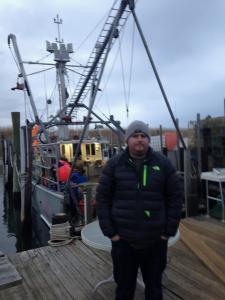Pat Fehily

Young Fishermen in the Northeast United States
Interviews with 39 fishers between the ages of 18-35, located along the US East Coast from Maine to North Carolina. Collectively, they represent a wide variety of gear types and fisheries. All had been fishing full-time for at least two years and wanted to make fishing their career. They describe motivations for choosing a fishing career, strategies used, barriers encountered, and facilitating factors that have enabled interviewees to defy the graying trend to become successful fishermen.
Please visit the Voices SoundCloud page to explore clips and stories that relate to this collection.
Sarah Schumann
Patrick Fehily, 29 years old at the time of the interview, owns and manages several lobster, gillnet, and scallop boats in Point Pleasant, NJ. Pat did not grow up in a fishing family, but after working as a lobsterboat deckhand in high school and failing to light his spark at college, he decided that fishing was the life for him. Pat quickly built a small fleet of boats and now acts as the shoreside manager for the business, a role that allows him to focus on sales and maintenance. Fehily now manages the shore side of the business, allowing him to focus on marketing and regulatory compliance.
Scope and Content Note
In the interview, Patrick Fehily discusses his journey into the fishing industry and the challenges he faced as a first-generation fisherman. Originally He emphasizes the importance of hard work, good business sense, and saving money to succeed in the fishing industry. Patrick also talks about the decline in young people entering the industry due to the high costs of permits and equipment, and he highlights the importance of adapting to changing regulations and market conditions to remain successful.
Patrick highlights the significance of scallops and how the industry operates mainly in federal waters with federal permits. He notes the bureaucratic challenges he faces due to past decisions and the need to predict future trends in the fishery. He mentions the difficulty of managing the fishery due to disagreements among fishermen, particularly in state lobster meetings. However, he notes that the corporate ownership in the scallop industry is beneficial, as it ensures stability and pushes the fishery in positive directions.
The interview touches on the lack of interest from younger people in the fishing industry, and Pat expresses concern about the declining number of young fishermen. With regard to graying of the fishing industry, Pat says, “There’s so much that we can do to recruit younger people into the business, and to understand that it’s still a thriving business and there’s still a lot of money to be made and a lot of pride and a lot of hard work, and don’t be afraid to go do it. I would hope that one day, National Marine Fisheries or NOAA or whoever, or our state regulatory bodies, would get together and try to work together to come up with an idea or a program or a panel or a council or something to come up with ways to recruit younger people into the fishery. Because that’s one thing that we don’t do. We’re so worried about preserving the stocks that we don’t think about the future on the human end of it. That’s going to be a huge problem for us down the road. I just hope that one day, we’ll see a resurgence of young people that want to go do this.”
Please Note: The oral histories in this collection are protected by copyright and have been created for educational, research and personal use as described by the Fair Use Doctrine in the U.S. Copyright law. Please reach out Voices@noaa.gov to let us know how these interviews are being used in your research, project, exhibit, etc. The Voices staff can help provide other useful resources related to your inquiry.
The NOAA mission is to understand and predict changes in climate, weather, oceans, and coasts, to share that knowledge and information with others, and to conserve and manage coastal and marine ecosystems and resources. The Voices Oral History Archives offers public access to a wide range of accounts, including historical materials that are products of their particular times, and may contain offensive language or negative stereotypes.
Voices Oral History Archives does not verify the accuracy of materials submitted to us. The opinions expressed in the interviews are those of the interviewee only. The interviews here have been made available to the public only after the interviewer has confirmed that they have obtained consent.
